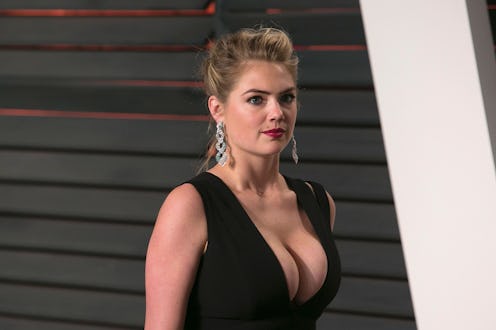Life
Vogue Debates Whether Or Not Cleavage Is "Over"
In a survey promoting its December issue, British Vogue asks readers, “Is cleavage over?” The question comes in connection to an article by Kathleen Baird-Murray, titled “Desperately Seeking Cleavage,” in which Baird-Murray asks, “Whatever happened to the cleavage?” When Vogue asked readers on social media to vote on whether cleavage is “over” or not, many were outraged by the suggestion that cleavage (and, more generally, breast shape and size) is a matter of trendiness. Unsurprisingly, the Twitter backlash has been brutal. Update: This article has been revised to include comments from Kathleen Baird-Murray.
In her article, Baird-Murray writes, “The cleavage — those magnificent mounds pushed together to display sexual empowerment, to seduce, to inspire lust or even just to show off — is over, or at least, taking a well-earned break,” adding, “The tits will not be out for the lads. Or for anyone else, for that matter.”
On Wednesday, Vogue asked readers on Twitter and Facebook to assess whether cleavage is indeed truly “over,” and many were offended by what they perceived to be the implication that large or closely-set breasts were somehow unfashionable. A number of respondents pointed out that some women always have cleavage, due to the size and shape of their breasts, and that to argue that a woman’s natural body shape could go out of style, like boot cut jeans or platform shoes, is offensive and body shaming. Women have enough to deal with without having to worry about whether their breasts conform to the latest trends.
Baird-Murray has responded to the controversy on Twitter, arguing that her article is about the way that fashion addresses breasts, not breasts themselves.
To a certain extent, I see Baird-Murray’s point: It’s fair to discuss how fashion approaches the body, and to explore how changes in fashion reflect evolving conceptions of gender, sexuality, and power. But I think it’s also difficult to cleanly separate discussions of women’s fashion from discussions of the female body, as if fashion trends don’t contribute to cultural hierarchies that value some bodies over others. Fashion has literally shaped women’s bodies for centuries, accentuating some body parts and deemphasizing others. Every era of women’s fashion has a distinctive silhouette, from the boyish straight-lines of the 1920s, to the voluptuous hourglass of the 1950s, and these trends in clothing haven't existed separately from the bodies underneath. Fashion has always had an impact on cultural perceptions of what is and is not “desirable” in a woman’s body, and I think nearly every woman on the planet has felt the pressure of being in that “undesirable” category at one point or another.
In Vogue’s survey, 67 percent of voters were pro-cleavage, while 11 percent agreed, “Cleavage is over.” But how can cleavage be over? The very idea suggests that cleavage somehow exists independently of the body. Yes, clothing can be used to create or emphasize cleavage, and trends in clothing can change. But, at the end of the day, cleavage is made of breasts, and breasts aren’t accessories. Some people will always have cleavage, and some will never have cleavage, and everyone one of them is just fine.
Update: In a statement to Bustle, Kathleen Baird-Murray remarks on the controversy surrounding her article,
I welcome discussion, I welcome differences of opinion, we really need these in our society and in an age where image is more important than ever before — rightly, or wrongly. I am really happy that the article has been hijacked and turned into something bigger than a fashion story, but it's unfortunate that while it's been thought provoking, it's based on a misconception that Vogue is somehow saying that anyone with a large chest needs to stay at home for the next few years and hang their heads in shame — sorry folks, that's not what the story's about, not even close.
Baird-Murray suggested that many critics have not actually read her full article, telling Bustle that although “[b]ody fascism is a massive issue and one that needs to be taken seriously,” by “not even bothering to read what we're protesting about,” we run the risk of “trivializing important issues.”
She continues,
[Y]es, as someone whose nightclub years were in the 90s, and whose go-to look was the Vivienne Westwood bustier, the Helen Storey/Patricia Field bra top, who saw Madonna sing live in her conical Jean Paul Gaultier Bra… I've always loved the cleavage — but now? I'm just not feeling it (no pun intended). That doesn't make me a body fascist. That just makes me someone who loves a pussy-bow blouse and doesn't like bras with padding in them. Who is happy to be raising a daughter in an age where she can choose to wear what she wants, and enjoy her freedom to express herself whichever way she chooses.
